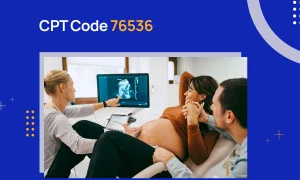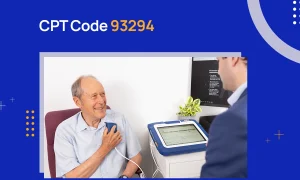Anesthesia services require precision, not only in the administration of the service but also in how you document and code it for billing.
Usually, this is done by using the relevant modifiers in your claim to provide additional information on the situation in which anesthesia was administered. According to the American Association of Nurse Anesthesiology (AANA), CRNAs administer more than 58 million anesthetics annually in the United States. And modifier QZ plays a critical role in its billing.
In this blog, we will explain what modifier QZ is, when it is used, and how to use it the right way to maximize your reimbursements. So, let’s start.
Modifier QZ Description
The modifier QZ is a Healthcare Common Procedure Coding System (HCPCS) modifier. It is used in situations where a Certified Registered Nurse Anesthetist (CRNA) works independently and provides anesthesia services without the supervision or direction of a physician.
This modifier serves dual purposes. First, it is a medical direction modifier, which points out the absence of physician supervision. Second, it is a pricing modifier that affects the reimbursement amount. In most cases, whenever the modifier QZ is used, 100% of the reimbursed amount is given to the CRNA.
As of now, 25 states and Guam have opted out of Medicare’s requirement for the physician supervision of CRNAs. This means that the QZ modifier is used often in anesthesia billing.
So, it is essential to understand how this modifier works and what makes it different from other anesthesia modifiers. Here’s a quick comparison:
| Modifier | Description |
|---|---|
| QK | When an anesthesiologist medically directs two to four concurrent anesthesia cases, QK is used. |
| QX | Indicates a CRNA or an anesthesiologist assistant (AA) was medically directed by a physician. |
| QY | Indicates a CRNA or an anesthesiologist assistant (AA) was medically directed by an anesthesiologist. |
| AA | Denotes that an anesthesiologist personally performed the anesthesia service. |
Modifier QZ Examples
Let’s now look at real-life scenarios where modifier QZ can be used.
Obstetric Care in Community Hospitals
In labor and delivery units, doctors are under immense pressure and are usually not available to administer anesthesia. In this situation, CRNAs frequently provide epidural anesthesia for childbirth. That is especially true for small hospitals that don’t have a proper anesthesiology staff.
So, if a CRNA administers an epidural for a patient without the presence or supervision of a physician, then modifier QZ is applicable. This scenario is common in states that allow CRNAs full authority to practice unsupervised.
Emergency Room Procedures
In emergency rooms, particularly in remote hospitals, when immediate access to a physician is limited, CRNAs often take charge of anesthesia for urgent procedures. For instance, if a patient comes to the emergency room for quick sedation for a fracture reduction, a CRNA may independently manage the anesthesia.
To bill for this procedure, the CRNA adds modifier QZ to the insurance claim.
Pain Management Clinics
In some pain management clinics, CRNAs administer nerve blockers or other pain relief medication independently. For instance, a CRNA might administer a lumbar epidural steroid injection to a patient with chronic back pain.
In this setting, modifier QZ is used on claims to indicate that the CRNA provided the service autonomously. It is crucial for clinics operating in areas with limited access to physician specialists.
Now, these scenarios are not hypothetical. The AANA reports that CRNAs are the primary anesthesia providers in almost 100% of rural hospitals. This shows the importance of the QZ modifier.
Moreover, this modifier ensures that healthcare facilities in underserved areas can sustain their services while compensating providers.
Accurate Usage Guidelines for Modifier QZ
To successfully file a claim with modifier QZ, you must pay attention to details and adhere to specific rules. Below, we have provided some guidelines to help you use the modifier accurately:
Check State and Payer Rules
The scope of a CRNA and the use of modifier QZ vary from state to state. In opt-out states like California or Iowa, CRNAs can work independently without restriction, making QZ more common. On the contrary, other states like Florida still require the supervision of anesthesiologists. This limits the use of QZ in these states.
Use with Anesthesia CPT Codes Only
Please note that the modifier QZ is applied exclusively to anesthesia procedure codes. The CPT code for anesthesia-related procedures falls within the range of 00100 to 01999.
These codes encompass various anesthesia types, like general anesthesia, regional anesthesia, and monitored anesthesia care. If you use the QZ modifier outside this CPT code range, then your claims have a high chance of getting rejected.
Ensure the Correct Placement
As a pricing modifier, QZ must be the first modifier listed on your claim form. If you have to use any other modifiers in your claim related to different procedures, then they will come after QZ. This order ensures that insurance companies process the claim correctly.
Confirm No Medical Direction and Maintain Documentation
Use the QZ modifier only when the CRNA provides anesthesia without physician supervision. If an anesthesiologist supervises the case, then modifier QY is a better choice. Misapplying QZ in a directed scenario can trigger audits or repayment demands.
Plus, it is essential to back up your case with proper documentation. The medical record should explicitly state that the CRNA acted independently. It must provide details about the anesthesia plan, patient monitoring, and procedure specifics.
Conclusion
The modifier QZ is one of the most used anesthesia modifiers. It works as both a pricing and a medical direction modifier. If you use this modifier correctly, you can ensure fair pay for your CRNAs and reduce billing errors.
With this guide, we believe you have all the necessary information to use the QZ modifier in the right situations and successfully bill the claims for fair reimbursements. However, if you are still having problems with filing anesthesia claims or with medical billing in general, then the best solution is to outsource medical billing and coding services to our experts at NeuraBill.



